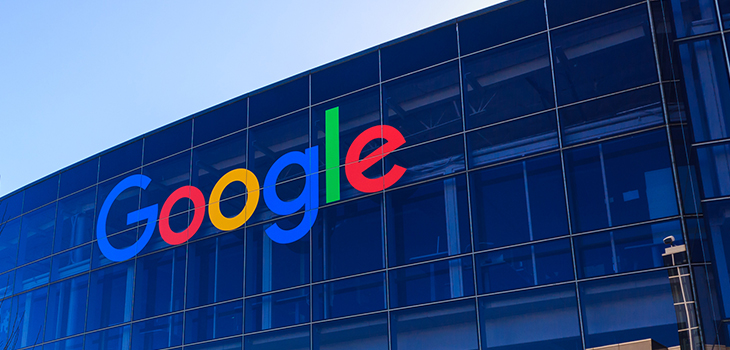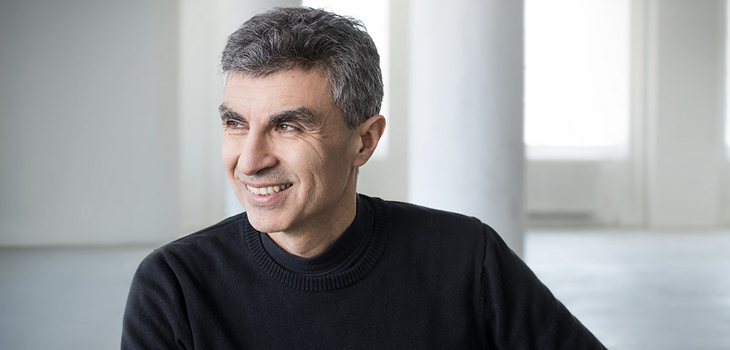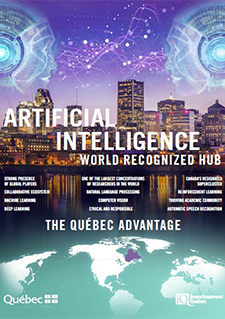
Information and communication technologies
Montréal’s Artificial Intelligence Hub
Montréal is now a major global hub for artificial intelligence (AI) research and it’s AI ecosystem is thriving. Here are a few good reasons you should consider Montréal for your next destination.
Top expertise
Montréal boasts an exceptionally high concentration of expertise in the area of AI, thanks in part to the efforts of Université de Montréal professor Yoshua Bengio, one of the founding fathers of the deep learning movement and head of the Montréal Institute for Learning Algorithms (MILA).
McGill University and Université de Montréal have more than 250 researchers and doctoral students in fields related to artificial intelligence, the largest AI academic community in the world.
Montréal also has famous researchers in automatic speech recognition, computer vision, natural language processing and reinforcement learning.
Exceptional talent, top players and generous tax incentives: Discover the competitive edges making Québec one of the most important AI hub in the world!
Funding available
Québec has received $100 million over five years for the creation of an AI cluster and $40 million for the Pan-Canadian Artificial Intelligence Strategy.
McGill University and Université de Montréal were granted $84 million and $93.5 million respectively from the $900-million Canada First Research Excellence Fund to pursue their AI-related research.
Attracting the biggest players
Major players are investing in Montréal’s AI industry, including DeepMind, Facebook, Google, Microsoft, Samsung and Thales.

Montréal will host a yearly North American summit on artificial intelligence from 2019 to 2021. Under an agreement with Inspired Minds, the London-based firm behind World Summit AI, Montréal will host the the Americas version of the event, which is expected to attract some 1,000 participants and 70 speakers on April 2 and 3, 2019.

The young U.S. company Jumio
 , the creator of the Netverify™ identity verification service, will open an AI research lab in Montréal. Directed by Labhesh Patel, AI Labs expects to have a team of 30 researchers by the end of 2019. They will focus on developing deep learning models and best practices in order to revolutionize online identity verification techniques and detect fraud.
, the creator of the Netverify™ identity verification service, will open an AI research lab in Montréal. Directed by Labhesh Patel, AI Labs expects to have a team of 30 researchers by the end of 2019. They will focus on developing deep learning models and best practices in order to revolutionize online identity verification techniques and detect fraud.
Although it’s been only a year since it set up shop in Québec’s largest city, Facebook’s Artificial Intelligence Research lab (FAIR) is booming. The team at FAIR has increased its numbers fivefold, from 4 to 20 researchers, and launched a number of new basic research projects. Joëlle Pineau, Head of FAIR, says that the lab will soon expand into new premises and expects to double the size of her team in the next year.
-
Microsoft Research will move into its new labs near the Montreal Institute for Learning Algorithms (MILA) in fall 2019. The new labs are three times larger than its previous facilities, and the multinational, which acquired Montréal-based Maluuba in January 2017, now employes 200 people in the city. Located in the Mile-Ex neighbourhood, the new premises will enable the company to grow its team of researchers and engineers in the coming years.

Since 2016, Google has set up two research teams on AI and deep learning in Montréal. The first, launched by its British subsidiary DeepMind, is led by industry pioneer Doina Precup. The second, part of the Google Brain division, is led by eminent professor Hugo Larochelle, a native Quebecer whom Google repatriated from Boston. Google has also invested $4.5 million to support the research conducted at the Montreal Institute for Learning Algorithms (MILA).

In July 2018, the Québec government announced that it would invest $80 million over the next five years to strengthen the critical role played by the Montreal Institute for Learning Algorithms (MILA) in the expansion of Québec’s AI ecosystem. Under the scientific leadership of Yoshua Bengio, MILA will pursue its basic research into machine learning and its work on technology transfers in partnership with a number of private laboratories, AI start-ups and other small businesses launched by students.
Here are a few profiles of Montréal AI ecosystem leaders—some well known, some not.
- Automat
 is a messaging and indexing bot-focused start-up with over 15 patents in areas like voice recognition and natural language understanding.
is a messaging and indexing bot-focused start-up with over 15 patents in areas like voice recognition and natural language understanding. - Element AI
 is an incubator that helps organizations harness the power of artificial intelligence (AI). Boasting a research lab connected to the world’s top universities, Element AI creates and incubates novel AI-first solutions in partnership with large corporations.
is an incubator that helps organizations harness the power of artificial intelligence (AI). Boasting a research lab connected to the world’s top universities, Element AI creates and incubates novel AI-first solutions in partnership with large corporations. - Facebook
 is developing new AI algorithms in its Montréal research lab, its first in Canada and fourth in the world after New York, Paris and Menlo Park, California. Its research will help improve the effectiveness of virtual assistants by better understanding online dialogue mechanisms.
is developing new AI algorithms in its Montréal research lab, its first in Canada and fourth in the world after New York, Paris and Menlo Park, California. Its research will help improve the effectiveness of virtual assistants by better understanding online dialogue mechanisms. - Fluent AI
 offers a patented voice recognition solution that works with most languages and accents, allowing for natural-language interactions with voice-operated systems and machines.
offers a patented voice recognition solution that works with most languages and accents, allowing for natural-language interactions with voice-operated systems and machines. - Imagia
 uses deep learning to analyze medical imaging data to predict cancer patient outcomes with increasing accuracy. Yoshua Bengio assists Imagia as a scientific advisor for learning aspects.
uses deep learning to analyze medical imaging data to predict cancer patient outcomes with increasing accuracy. Yoshua Bengio assists Imagia as a scientific advisor for learning aspects. - Nuance
 employs over 140 researchers at several labs, including one in Montréal, that focus on artificial intelligence and natural language processes.
employs over 140 researchers at several labs, including one in Montréal, that focus on artificial intelligence and natural language processes. - Google
 and Microsoft
and Microsoft  are also part of Montréal’s AI ecosystem. Google’s Montréal team formed its own research group, led by researcher Hugo Larochelle and connected to the Google Brain team in California, while Microsoft acquired Maluuba.
are also part of Montréal’s AI ecosystem. Google’s Montréal team formed its own research group, led by researcher Hugo Larochelle and connected to the Google Brain team in California, while Microsoft acquired Maluuba.
Top News in Québec
Other
sites
Productivité innovation website (in French only)
Compétivert(in French only)









